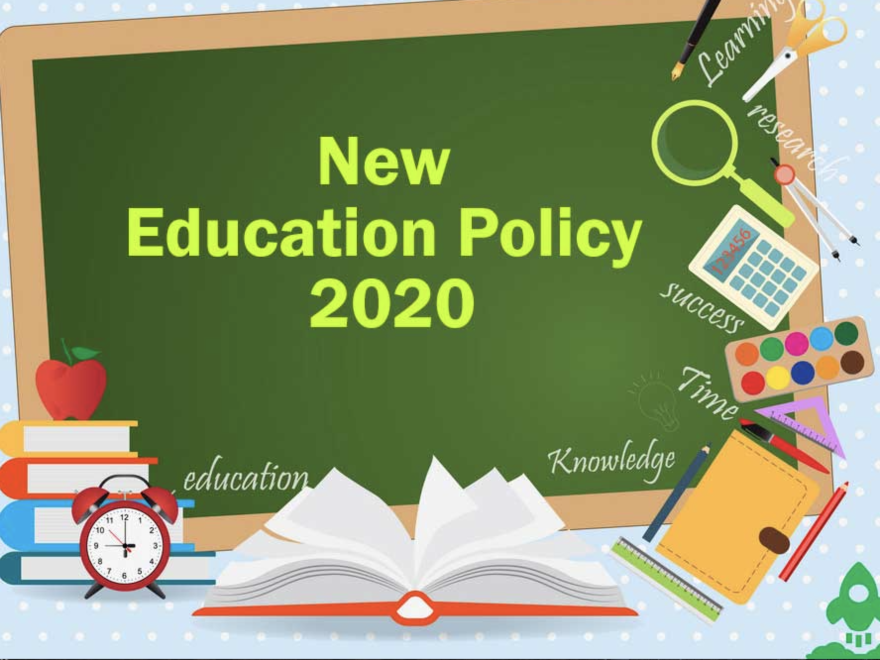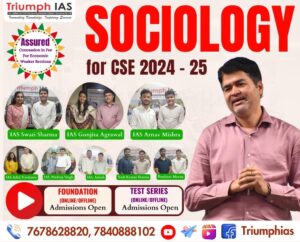Highlight the salient features of the New Education Policy (NEP) 2020
Section: A.
Sociology Paper 2023 Analysis.
Relevant for Paper-1 : Politics and Society
Question- 5 (C): Highlight the salient features of the New Education Policy (NEP) 2020
(10 Marks)
|
Introduction: Provide background and context, introducing the topic and its significance. Main Body: Present key features of new education policy and integrate it to perspectives of various sociologists. Conclusion: On the lines of empowerment of individuals. |
Introduction:
The National Education Policy (NEP) 2020 in India comes 34 years after the previous policy, announced in 1986 and revised in 1992. It took six years of work and consultations with thousands of educators, policymakers, and members of civil society. It was truly a democratic effort and is highly aspirational, aiming for India to “have an education system by 2040 that is second to none with equitable access to the highest quality education for all learners, regardless of social and economic background.”
Main body:
- Durkheim posited that education serves as a conduit for the transmission of social norms. The NEP’s chief purpose aligns with Durkheim’s idea, aiming to reform the education system and bridge the gap between current learning outcomes and those desired. It recognizes the evolving world and articulates that the purpose of the education system is to develop good human beings capable of rational thought, compassion, empathy, courage, resilience, scientific temper, and creative imagination.
- Parsons viewed schools as microcosms of societies, emphasizing that educational achievement results in disparate rewards. NEP 2020 seeks to address disparities by broadening the scope of “quality education” and shifting towards holistic, inquiry-based learning, reducing the emphasis on rote learning and content-based examinations.
- Sally Tomlinson advocated for education as a liberating, humanizing, and democratizing force. NEP 2020’s emphasis on equity, inclusion, and multidisciplinary education aligns with the idea of education as a liberating force, aiming to create engaged, productive, and contributing citizens for an equitable and inclusive society.
- NEP’s biggest effort is to bring gender sensitivity as an integral part of curriculum and gender inclusion fund to be raised upto class 12 which covers all the socio-economically disadvantaged groups and also the transgenders.
- Bowles and Gintis characterized the education system as a myth-making machine with a hidden curriculum that serves the interests of the dominant group. NEP 2020 aims to break away from traditional silos of education streams and emphasizes multidisciplinary education, addressing the hidden curriculum by focusing on 21st-century skills and critical thinking.
- Ivan Illich argued that education reinforces existing social relations and stifles creativity. And Pierre Bourdieu highlighted the role of education in reproducing cultural capita NEP 2020 addresses these concerns by promoting inclusive education, avoiding segregation, and focusing on diverse languages, ensuring that education is not a tool for reproducing inequalities.
- Learning becomes more abstract at higher levels, the ability to comprehend abstract ideas is tied to linguistic proficiency. Individuals from different sections of society like tribal, with diversified linguistic ability, face challenges in acquiring cultural capital, an investment that assures returns.
- Hence focus of new education policy on vernacular language has tried to solve the issue and make learning easier.
- The focus on teacher training and new pedagogical and curriculum as envisaged by New Education Policy helps for better adaptational capacity and help in motivation mobilisation.
Conclusion:
The National Education Policy (NEP) 2020 emerges as a transformative initiative, echoing the insights of educational philosophers. It aspires to reshape education, fostering rationality, inclusivity, and creativity, dismantling traditional paradigms to create a system that empowers individuals and transcends socio-economic barriers.
Related Blogs…
To master these intricacies and fare well in the Sociology Optional Syllabus, aspiring sociologists might benefit from guidance by the Best Sociology Optional Teacher and participation in the Best Sociology Optional Coaching. These avenues provide comprehensive assistance, ensuring a solid understanding of sociology’s diverse methodologies and techniques.
META TAGS:
Iron Law of Oligarchy, Robert Michels, Vilfredo Pareto, Lions and Foxes theory, power dynamics, organizational oligarchy, elite circulation, political sociology, leadership styles, organizational control, sociological theories, political maneuvering, elite differentiation, power concentration, societal stability, political leadership, strategic political leadership, Sociology Question Paper, Sociology Question Paper 2023, Sociology Question Paper CYQ, Sociology Question Paper UPSC, What, according to Robert Michels, is the iron law of oligarchy? Do lions and foxes in Vilfredo Pareto’s theory, essentially differ from each other? Substantiate.
Why Vikash Ranjan’s Classes for Sociology?
Proper guidance and assistance are required to learn the skill of interlinking current happenings with the conventional topics. VIKASH RANJAN SIR at TRIUMPH IAS guides students according to the Recent Trends of UPSC, making him the Best Sociology Teacher for Sociology Optional UPSC.
At Triumph IAS, the Best Sociology Optional Coaching platform, we not only provide the best study material and applied classes for Sociology for IAS but also conduct regular assignments and class tests to assess candidates’ writing skills and understanding of the subject.
Choose The Best Sociology Optional Teacher for IAS Preparation?
At the beginning of the journey for Civil Services Examination preparation, many students face a pivotal decision – selecting their optional subject. Questions such as “which optional subject is the best?” and “which optional subject is the most scoring?” frequently come to mind. Choosing the right optional subject, like choosing the best sociology optional teacher, is a subjective yet vital step that requires a thoughtful decision based on facts. A misstep in this crucial decision can indeed prove disastrous.
Ever since the exam pattern was revamped in 2013, the UPSC has eliminated the need for a second optional subject. Now, candidates have to choose only one optional subject for the UPSC Mains, which has two papers of 250 marks each. One of the compelling choices for many has been the sociology optional. However, it’s strongly advised to decide on your optional subject for mains well ahead of time to get sufficient time to complete the syllabus. After all, most students score similarly in General Studies Papers; it’s the score in the optional subject & essay that contributes significantly to the final selection.
“A sound strategy does not rely solely on the popular
Opinion of toppers or famous YouTubers cum teachers.”
It requires understanding one’s ability, interest, and the relevance of the subject, not just for the exam but also for life in general. Hence, when selecting the best sociology teacher, one must consider the usefulness of sociology optional coaching in General Studies, Essay, and Personality Test.
The choice of the optional subject should be based on objective criteria, such as the nature, scope, and size of the syllabus, uniformity and stability in the question pattern, relevance of the syllabic content in daily life in society, and the availability of study material and guidance. For example, choosing the best sociology optional coaching can ensure access to top-quality study materials and experienced teachers. Always remember, the approach of the UPSC optional subject differs from your academic studies of subjects. Therefore, before settling for sociology optional, you need to analyze the syllabus, previous years’ pattern, subject requirements (be it ideal, visionary, numerical, conceptual theoretical), and your comfort level with the subject.
This decision marks a critical point in your UPSC – CSE journey, potentially determining your success in a career in IAS/Civil Services. Therefore, it’s crucial to choose wisely, whether it’s the optional subject or the best sociology optional teacher. Always base your decision on accurate facts, and never let your emotional biases guide your choices. After all, the search for the best sociology optional coaching is about finding the perfect fit for your unique academic needs and aspirations.
Follow us :
🔎 https://www.instagram.com/triumphias
🔎 https://www.youtube.com/c/TriumphIAS
🔎 https://t.me/VikashRanjanSociology
Find More Blogs…
| Compare and contrast Karl Marx’s and Max weber’s | Karl Marx- Historical Materialism |
| Position of Women In the Modern Indian Society | Sociology: Social system and pattern variables |
KEYWORD:
New Education Policy 2020,New Education Policy 2020,New Education Policy 2020,New Education Policy 2020,New Education Policy 2020,New Education Policy 2020,New Education Policy 2020,New Education Policy 2020,New Education Policy 2020,New Education Policy 2020,


